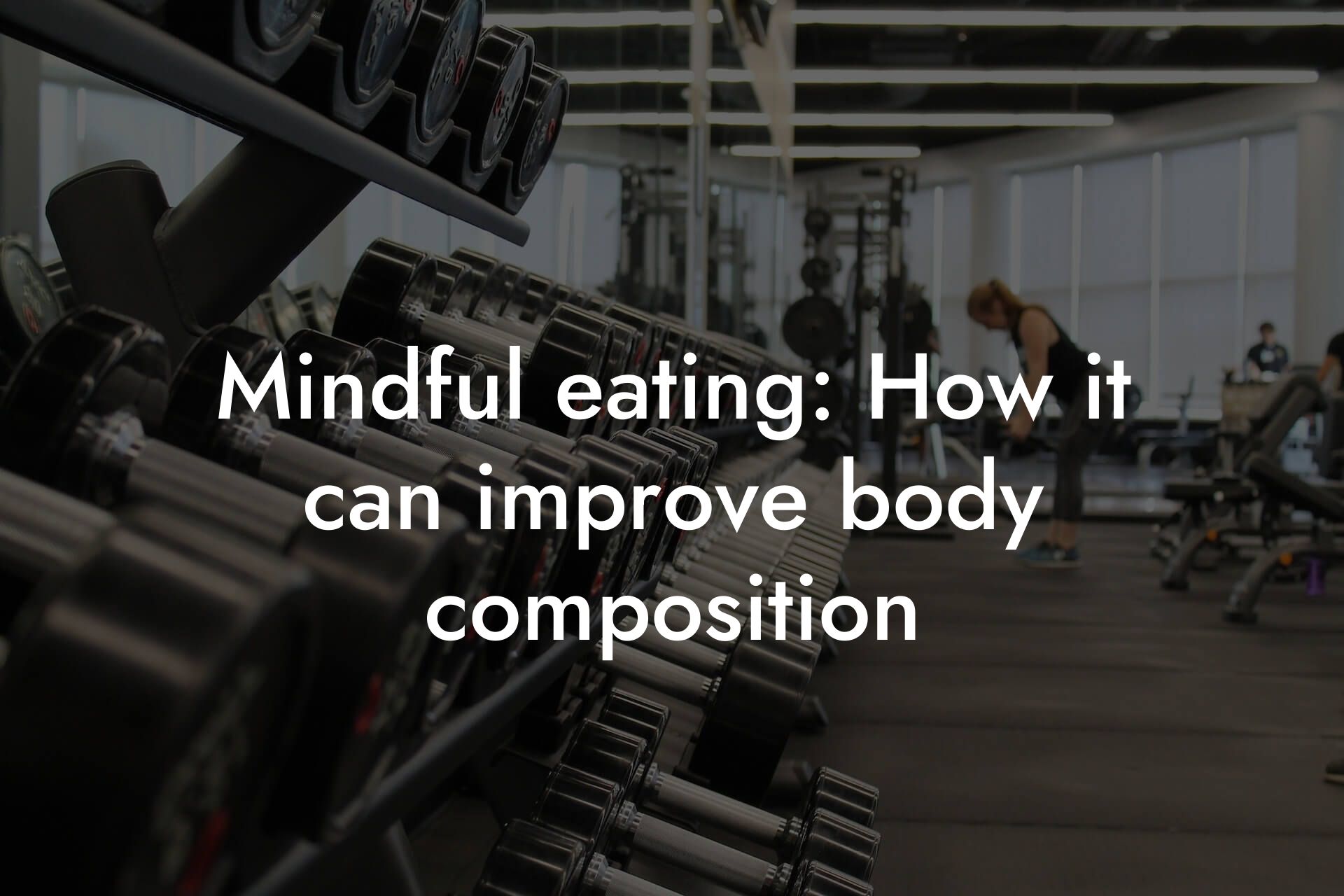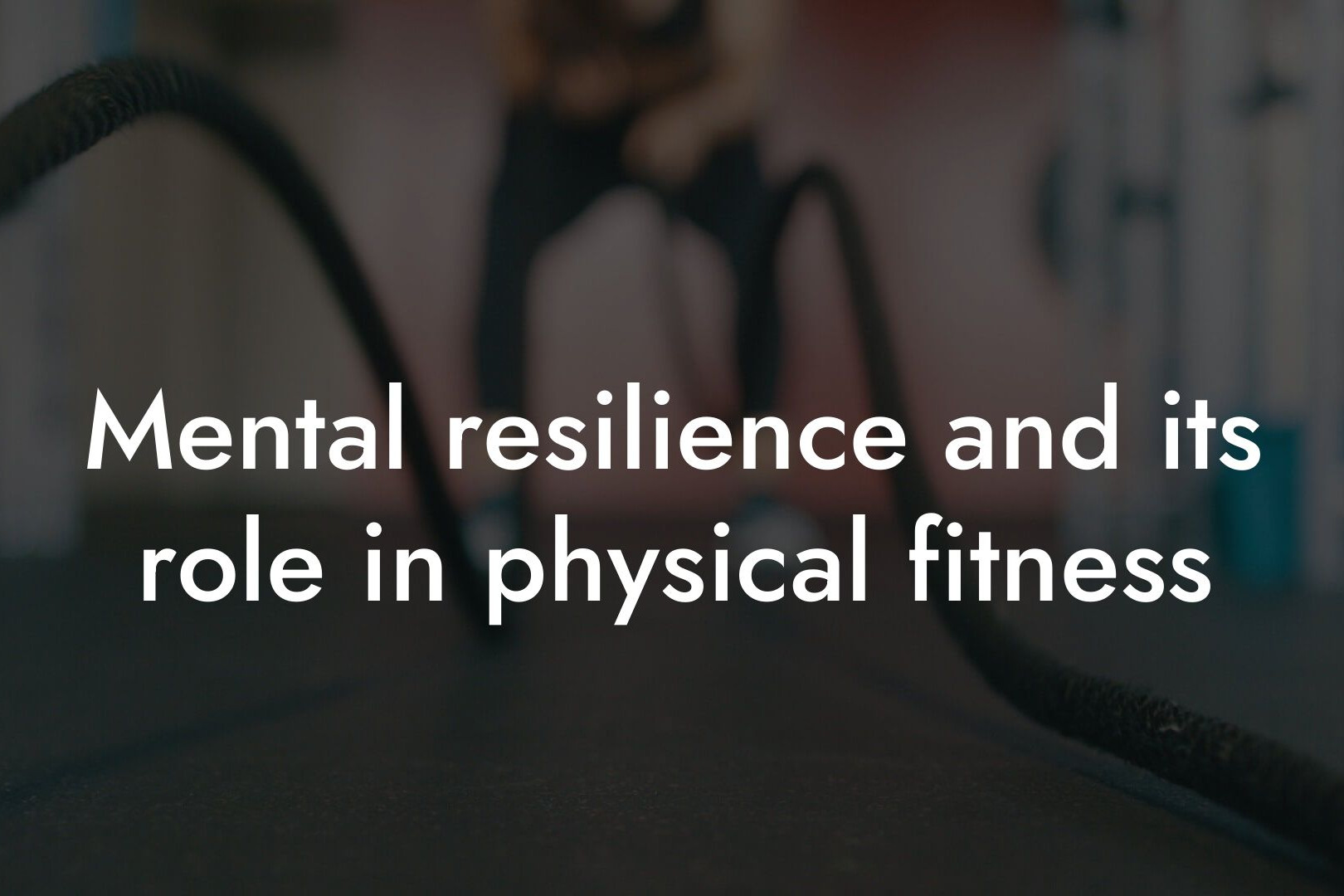As high-earning professionals, you understand the importance of taking care of your physical appearance and overall health. However, despite your best efforts, you may be struggling to achieve your weight loss goals. The truth is, weight loss is not just about diet and exercise; it's also about overcoming the mental barriers that hold you back. At Tano Performance Group, we believe that a complete body assessment using our state-of-the-art DEXA machine is just the starting point. To truly succeed, you need to address the underlying mental and emotional issues that are hindering your progress.
Table of Contents
The Power of Mindset in Weight Loss
Research has shown that a person's mindset plays a significant role in their ability to lose weight and maintain weight loss. A positive mindset can help you stay motivated, focused, and committed to your goals, while a negative mindset can lead to self-doubt, procrastination, and ultimately, weight gain. It's essential to recognize that your mindset is not fixed and can be changed through practice, patience, and persistence.
Common Mental Barriers to Weight Loss
So, what are the common mental barriers that prevent people from achieving their weight loss goals? Some of the most common ones include:
- Lack of self-confidence and self-worth
- Fear of failure or success
- Emotional eating and attachment to food
- Negative self-talk and self-criticism
- Unrealistic expectations and perfectionism
- Trauma and past experiences
- Lack of accountability and support
Breaking Down the Barriers: Strategies for Success
Now that we've identified some of the common mental barriers to weight loss, let's discuss some strategies for breaking them down:
- Practice self-compassion and self-kindness: Treat yourself with the same kindness and care that you would offer to a friend. Be gentle, understanding, and patient with yourself as you work towards your goals.
- Reframe negative self-talk: Replace negative and critical self-talk with positive and empowering affirmations. Focus on your strengths, accomplishments, and progress, rather than your weaknesses and failures.
- Develop a growth mindset: Embrace challenges and setbacks as opportunities for growth and learning. Believe that your abilities and intelligence can be developed through hard work, dedication, and persistence.
- Seek accountability and support: Surround yourself with people who support and encourage you. Join a weight loss group or work with a coach who can provide guidance, motivation, and accountability.
- Focus on progress, not perfection: Celebrate your small wins and acknowledge your progress, rather than striving for perfection. Recognize that weight loss is a journey, not a destination.
The Role of Emotional Eating in Weight Loss
Emotional eating is a common obstacle to weight loss, and it's essential to address it if you want to achieve your goals. Emotional eating is using food as a coping mechanism for emotional stress, anxiety, or other feelings. It's not about hunger or nutrition; it's about comfort, convenience, and emotional relief.
To overcome emotional eating, you need to identify your emotional triggers and develop healthier coping mechanisms. Some strategies include:
- Mindful eating: Pay attention to your hunger and fullness cues, savor your food, and eat slowly.
- Journaling: Write down your emotions, thoughts, and feelings before and after eating.
- Meditation and relaxation techniques: Practice deep breathing, yoga, or meditation to manage stress and anxiety.
- Healthy alternatives: Find healthier ways to cope with emotions, such as going for a walk, talking to a friend, or engaging in a hobby.
The Importance of Self-Care in Weight Loss
Self-care is not a luxury; it's a necessity for weight loss and overall well-being. When you take care of your physical, emotional, and mental health, you're better equipped to make healthy choices and stick to your goals. Some self-care strategies include:
- Getting enough sleep: Aim for 7-9 hours of sleep per night to help regulate hunger hormones and support weight loss.
- Exercise and physical activity: Engage in activities that bring you joy and make you feel good, such as walking, running, swimming, or yoga.
- Healthy relationships: Surround yourself with people who support and encourage you, and avoid toxic relationships that drain your energy.
- Leisure activities: Make time for hobbies, passions, and creative pursuits that bring you joy and fulfillment.
Conclusion: Overcoming Mental Barriers to Weight Loss
Weight loss is not just about diet and exercise; it's about overcoming the mental and emotional barriers that hold you back. By understanding the power of mindset, identifying common mental barriers, and developing strategies for success, you can break down the barriers and achieve your weight loss goals. Remember to practice self-compassion, reframe negative self-talk, develop a growth mindset, seek accountability and support, and focus on progress, not perfection. With the right mindset and strategies, you can overcome the mental barriers to weight loss and achieve the body and health you deserve.
At Tano Performance Group, we're committed to helping high-earning professionals like you achieve their weight loss goals and improve their overall health and well-being. Our state-of-the-art DEXA machine provides a complete body assessment, giving you the information you need to take your health to the next level. Contact us today to learn more about our services and how we can help you overcome the mental barriers to weight loss.
Frequently Asked Questions
What are mental barriers to weight loss?
Mental barriers to weight loss refer to the emotional, psychological, and cognitive obstacles that prevent individuals from achieving their weight loss goals. These barriers can include negative self-talk, low self-esteem, emotional eating, and unhealthy relationships with food, among others.
Why are mental barriers to weight loss important to address?
Mental barriers can be a significant obstacle to achieving and maintaining weight loss. If left unaddressed, they can lead to feelings of frustration, disappointment, and demotivation, making it even harder to reach weight loss goals. By addressing mental barriers, individuals can develop a healthier relationship with food, exercise, and themselves, increasing their chances of long-term weight loss success.
What are some common mental barriers to weight loss?
Common mental barriers to weight loss include negative self-talk, low self-esteem, emotional eating, perfectionism, and all-or-nothing thinking. Additionally, fear of failure, fear of success, and lack of motivation can also be significant obstacles.
How does negative self-talk affect weight loss?
Negative self-talk can lead to feelings of guilt, shame, and inadequacy, making it harder to stick to a weight loss plan. It can also lead to self-sabotage, where individuals may unconsciously undermine their own efforts to lose weight.
What is emotional eating, and how does it impact weight loss?
Emotional eating is the tendency to use food as a coping mechanism for emotional stress, boredom, or other feelings. This can lead to overeating, poor food choices, and weight gain. By addressing emotional eating, individuals can develop healthier coping mechanisms and a more balanced relationship with food.
How can I overcome perfectionism and all-or-nothing thinking?
Overcoming perfectionism and all-or-nothing thinking requires recognizing that small setbacks are a normal part of the weight loss journey. Focus on progress, not perfection, and celebrate small victories along the way. Additionally, practice self-compassion and remind yourself that it's okay to make mistakes.
What role does motivation play in overcoming mental barriers to weight loss?
Motivation is a crucial factor in overcoming mental barriers to weight loss. Identify your why – the reasons behind your desire to lose weight – and use it to drive your motivation. Celebrate small victories, reward yourself for progress, and find a support system to help you stay motivated.
How can I develop a healthier relationship with food?
Developing a healthier relationship with food involves recognizing emotional triggers, practicing mindful eating, and focusing on nutrient-dense foods. Aim to eat intuitively, listening to your body's hunger and fullness cues, and avoid restrictive dieting.
What is the importance of self-care in overcoming mental barriers to weight loss?
Self-care is essential in overcoming mental barriers to weight loss. Prioritize activities that bring you joy, practice stress-reducing techniques, and get enough sleep. By taking care of your overall well-being, you'll be better equipped to tackle mental barriers and achieve weight loss success.
How can I overcome fear of failure when it comes to weight loss?
Overcoming fear of failure involves reframing failure as an opportunity for growth and learning. Focus on progress, not perfection, and recognize that setbacks are a normal part of the weight loss journey. Celebrate small victories, and don't be too hard on yourself when you encounter obstacles.
What is the role of accountability in overcoming mental barriers to weight loss?
Accountability can be a powerful tool in overcoming mental barriers to weight loss. Share your goals with a trusted friend or family member, join a weight loss support group, or work with a health coach to stay accountable and motivated.
How can I stay motivated during periods of slow progress?
Staying motivated during periods of slow progress requires focusing on non-scale victories, such as increased energy, improved mood, or better sleep. Celebrate small victories, reward yourself for progress, and remind yourself why you started your weight loss journey in the first place.
What are some common myths about mental barriers to weight loss?
Common myths about mental barriers to weight loss include the idea that weight loss is solely about willpower, that mental barriers are a sign of weakness, or that weight loss is a quick fix. Recognize that mental barriers are a normal part of the weight loss journey and that overcoming them requires patience, self-compassion, and a holistic approach.
How can I prioritize my mental health during the weight loss journey?
Prioritizing mental health during the weight loss journey involves recognizing the importance of mental well-being, practicing self-compassion, and seeking support when needed. Focus on progress, not perfection, and celebrate small victories along the way.
What is the connection between mental barriers and physical health?
Mental barriers can have a significant impact on physical health, including increased stress, inflammation, and chronic disease risk. By addressing mental barriers, individuals can improve their overall physical health and increase their chances of long-term weight loss success.
How can I overcome mental barriers to weight loss as a high-earning professional?
As a high-earning professional, overcoming mental barriers to weight loss may require prioritizing self-care, delegating tasks, and seeking support from a health coach or therapist. Focus on finding balance and making healthy choices that align with your busy lifestyle.
What resources are available to help me overcome mental barriers to weight loss?
Resources available to help overcome mental barriers to weight loss include health coaches, therapists, support groups, and online resources such as Tano Performance Group. Take advantage of these resources to stay motivated, accountable, and informed throughout your weight loss journey.
How can I maintain weight loss once I've overcome mental barriers?
Maintaining weight loss requires ongoing effort and commitment. Focus on developing healthy habits, practicing self-care, and staying accountable. Celebrate small victories, and don't be too hard on yourself when you encounter setbacks.
What is the most important thing to remember when overcoming mental barriers to weight loss?
The most important thing to remember when overcoming mental barriers to weight loss is that it's a journey, not a destination. Focus on progress, not perfection, and prioritize your overall well-being above all else.
How can I get started on overcoming mental barriers to weight loss?
Getting started on overcoming mental barriers to weight loss involves recognizing the importance of mental well-being, identifying your why, and seeking support when needed. Take small steps towards developing a healthier relationship with food, exercise, and yourself, and celebrate small victories along the way.
Here are some related articles you might love...
- Mindful eating: How it can improve body composition
- Mental resilience and its role in physical fitness
- The role of visualization in achieving fitness goals
- The impact of chronic stress on body fat
- How meditation supports physical health
- The psychology of body image among professionals
- Body positivity vs body optimization: Finding balance
- Cognitive-behavioral strategies for fitness success
- How stress management improves body composition
Zak Faulkner
Zak Faulkner is a leading authority in the realm of physical health and body composition analysis, with over 15 years of experience helping professionals optimise their fitness and well-being. As one the experts behind Tano Performance Group, Zak has dedicated his career to providing in-depth, science-backed insights that empower clients to elevate their physical performance and overall health.
With extensive knowledge of DEXA technology, Zak specializes in delivering comprehensive body assessments that offer precise data on body fat, muscle mass, bone density, and overall physique. His expertise enables individuals to make informed decisions and achieve their fitness goals with accuracy and confidence. Zak’s approach is rooted in a deep understanding of human physiology, combined with a passion for helping clients unlock their full potential through personalised strategies.
Over the years, Zak has earned a reputation for his commitment to excellence, precision, and client-focused service. His guidance is trusted by top professionals who demand the best when it comes to their health. Whether advising on fitness programs, nutritional strategies, or long-term wellness plans, Zak Faulkner’s insights are a valuable resource for anyone serious about taking their health and fitness to the next level.
At Tano Performance Group, Zak continues to lead our Content Team revolutionising how professionals approach their physical health, offering unparalleled expertise that drives real results.




